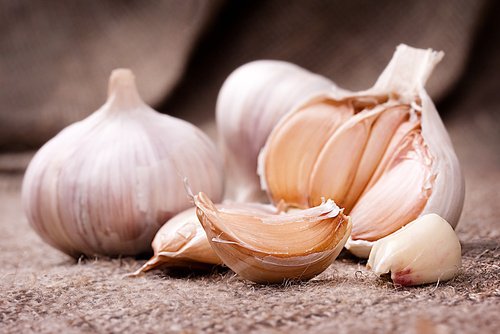9 Foods that Cause Body Odor


Reviewed and approved by the nutritionist Eliana Delgado Villanueva
The combined action of your sweat glands and skin and the volatile compounds you generate and bacterial activity cause body odor.
This process is usually triggered by hormonal or metabolic problems, although certain types of diseases or the consumption of particular medications can also cause it.
Many people think that sweat is the main cause of body odor. However, the truth is that many types of germs, dirt, and the combination of certain foods in your diet can all affect your body odor.
In this sense, the latter can alter your body’s pH causing excess acidity levels. This makes it hard to eliminate toxins, leading to a bad smell.
Read more here: 6 Smoothies to Eliminate Toxins
In addition to that, some foods contain strong substances that are excreted through your sweat or can be easily smelled on your breath. Do you know what they are?
Foods that cause body odor
1. Garlic

There are plenty of people who avoid eating garlic because the strong smell tends to linger on the breath for hours.
In addition, the volatile sulfur compounds in garlic can make your sweat smell bad. This substance is absorbed by your lungs and into the bloodstream after digestion is complete. Thus, this is why your breath and skin take on that signature odor.
2. Refined sugars
Candy chews and any type of food that’s made with refined sugar can cause changes in the body’s acidity levels, alter its temperature, and generate unpleasant body odor.
Bacteria feed on sweets. If they grow excessively, you’ll also see accelerated fermentation and a stronger smell.
3. Spices

Spices like curry and cumin tend to cause bad breath as well as body odor because, when you consume them, your pores eliminate the sulfurous gases that you digest.
Although most of the time they’re properly assimilated by the body, other times they remain in your bloodstream.
4. Hydrogenated oils
The food industry uses hydrogenated oils to prepare junk food, fried foods, and pastries, among other items. They’re not just a leading cause of obesity, but they’re also related to the production of body odor.
It seems that this type of fat makes digestion more difficult. In this regard, it has a negative interaction with other foods that your intestines process.
5. Pork

Pâté, sausage, bacon, and other cured pork products can increase your stomach’s acidity levels and cause gas.
They’re broken down in your digestive system very slowly. Thanks to their high fat and chemical contents, they disrupt the metabolic functions that eliminate toxins.
6. Red meat
The proteins contained in red meat are harder for the body to digest. Also, due to the fact that they can linger in the intestines for several days, they can ferment and cause body odor.
People who eat fewer servings of red meat a week don’t have such strong-smelling sweat than those who eat it on a regular basis.
In addition, cutting red meat from your diet helps avoid gas, abdominal inflammation, and constipation.
7. Asparagus

Although it’s a very healthy food, asparagus can cause a strong and acidic odor in your urine due to its natural decomposition in the body. This only happens to certain people who have a genetic variation to produce and perceive certain odors.
8. Alcoholic beverages
People who drink excessively have a more unpleasant smelling skin and breath. Your body processes alcohol as a toxin, so your liver is in charge of metabolizing it.
Almost 90% of it is converted into acetic acid. This is a non-toxic substance that’s eliminated from the body along with other excess fluids and salts.
The rest, which remains in your bloodstream, is removed through the lungs through normal respiration or through your pores as sweat.
We recommend reading: Effects of Alcohol on the Body
9. Onion

In this regard, these sulfurous compounds are absorbed into the bloodstream and reach the mouth, stomach, intestines, and liver. They’re also transported to the lungs where if they build up in large quantities. Thus, they can create a strong odor when you exhale.
If you have bad body odor despite having good hygiene and being in good health, odds are that some of your dietary choices are the culprits. Try cutting them out from your diet!
All cited sources were thoroughly reviewed by our team to ensure their quality, reliability, currency, and validity. The bibliography of this article was considered reliable and of academic or scientific accuracy.
- Yaegaki K, Coil JM. Examination, classification and treatment of halitosis; clinical perspectives. J Can Dent Assoc 2000; 66: 257-61.
- A. Allevato Miguel. Mal olor corporal. (2006) atdermae.com/pdfs/atd_29_01_06.pdf
- Biblioteca Nacional de Medicina de los EE.UU. Hiperdidrosis. medlineplus.gov/spanish/ency/article/007259.htm
- The Ohio State University. 5 foods and drinks that affect body odor. (2019). recuperado el 1 de septiembre de 2020. https://wexnermedical.osu.edu/blog/5-foods-and-drinks-that-affect-body-odor#:~:text=Our%20bodies%20metabolize%20alcohol%20into,also%20gets%20secreted%20into%20sweat.
- Jan Havlicek, Pavlina Lenochova, The Effect of Meat Consumption on Body Odor Attractiveness, Chemical Senses, Volume 31, Issue 8, October 2006, Pages 747–752, https://doi.org/10.1093/chemse/bjl017
- Clínica Mayo. Sudoración y olor corporal. (2020). Recuperado el 1 de septiembre de 2020. https://www.mayoclinic.org/es-es/diseases-conditions/sweating-and-body-odor/diagnosis-treatment/drc-20353898
- Morales-González, J. A., Madrigal-Bujaidar, E., Sánchez-Gutiérrez, M., Izquierdo-Vega, J. A., Valadez-Vega, M., Álvarez-González, I., Morales-González, Á., & Madrigal-Santillán, E. (2019). Garlic (Allium sativum L.): A Brief Review of Its Antigenotoxic Effects. Foods (Basel, Switzerland), 8(8), 343. https://doi.org/10.3390/foods8080343
This text is provided for informational purposes only and does not replace consultation with a professional. If in doubt, consult your specialist.








